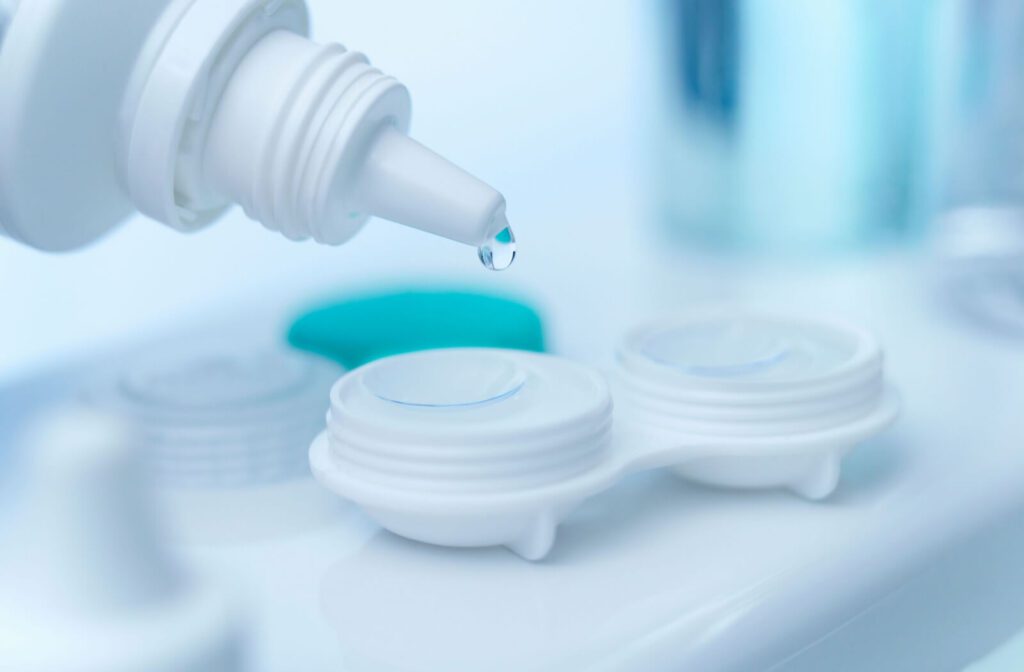Table of Contents

Introduction
Glasses may have been the only option for people with specific eye problems. But now, there are specialty contact lenses for almost everyone. An estimated 45 million people in the United States wear contact lenses.
While the majority of them use soft contact lenses, hard contact lenses provide a solution for individuals who can’t wear standard contact lenses. An example is scleral contact lenses, a type of gas permeable contact lens.
We discuss scleral contact lenses, the conditions they correct, types, and benefits.
Scleral Contact Lenses
Soft contact lenses are the same size as your cornea and sit on the cornea, the clear front part of the eye. Sclera contact lenses, in comparison, are firm, hold their shape, and are larger.
As the name suggests, they rest over the cornea and the sclera, the whites of the eye. Many scleral lenses can measure between 14 to 24 millimeters in diameter and are custom-made for the individual.
These gas-permeable contact lenses allow oxygen to reach the cornea to maintain healthy and comfortable eyes. The lenses also create a vault over the cornea that holds a fluid reservoir to keep the eyes moist and helps compensate for cornea irregularities.
Scleral contact lenses, like other lenses, correct vision problems. These can include:
- Myopia or nearsightedness
- Hyperopia or farsightedness
- Astigmatism or distorted vision
- Presbyopia or near vision difficulty that comes with age
- Keratoconus or irregularly shaped cornea
- Dry eyes
- Post-refractive surgeries such as LASIK (laser in-situ keratomileusis) or corneal transplants
- Hart-to-fit eyes
Process for Inserting Scleral Contact Lenses
The steps to inserting scleral contact lenses differ from soft contacts, especially since they are rigid, larger in size, and contain a fluid reservoir. Inserting and removing can take some practice and include the following steps:
- Thoroughly wash hands with soap and water and dry with a lint-free towel.
- Fill the reservoir with a preservative-free saline solution.
- Remove any bubbles, as these can cause blurry vision.
- Insert the lens using the three-finger tripod method.
Types of Scleral Contact Lenses
Corneo-Scleral & Semi–Scleral Lenses
Mini Scleral Lenses
Full Scleral Lenses
This type is the biggest of the scleral lenses, offers the most coverage, and provides the largest arch between the cornea and the lens. These may benefit in advanced keratoconus, severe or chronic dry eyes, or severe ocular disease.
Benefits of Scleral Contact Lenses
Scleral contact lenses can benefit anyone with eye conditions or corneal irregularities that make wearing contact lenses difficult. Benefits can include:
- Better or sharper vision
- Used for longer periods
- Greater durability
- More stable with less risk of moving
- Breathable
- Easy handling
- Lubricating reservoir to continually provide moisture
- Dry eye relief
- Larger diameter for more comfort
- Can reduce the need for surgical intervention

How to Care for Your Scleral Contact Lenses
It’s important to take proper care of scleral lenses to avoid complications and infections and to maintain optimal vision and eye health. Measures can include:
- Washing hands before touching the eyes or handling contacts.
- Removing lenses before bedtime. Sleeping in sclera contact lenses can lead to complications, corneal abrasions, or ulcers.
- Refrain from wearing your contacts when showering or swimming, as water can contain germs.
- Clean your lenses daily with a contact lens solution to prevent protein deposits or accumulation of bacteria and debris.
- Gently rub the lens on both sides.
- Use and fill the contact lens case with fresh lens solution every time.
- Replace the contact lens case every 3 months.
If you experience discomfort, redness, or painful eyes, remove your contact lenses and contact your eye doctor immediately.
A Comfortable Solution with Scleral Contact Lenses
You can’t ignore the advantages of scleral contact lenses, especially for individuals where standard contact lenses don’t work. If you fit into this group and are interested in a solution for your eye issues, book an appointment with Golden Vision. Our experience and expertise can give you access to options.

